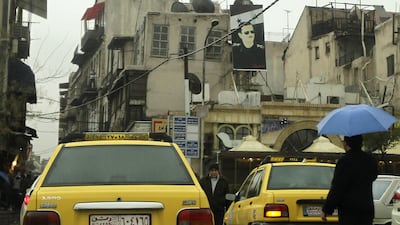Alia Malek
Nation Books,
Dh70
Alia Malek's newly released The Home That Was Our Country: A Memoir of Syria follows the author as she struggles to reclaim her grandmother's Damascus home, her family narrative and her country's history.
In broad strokes, Malek's second work of non-fiction is much like Lebanese-American journalist Anthony Shadid's House of Stone (2012). Both narratives required a steady hand, as they thread through family lore and violently contested histories.
But The Home That Was Our Country sets off through even rougher terrain. Malek wrote her book in the early years of Syria's civil war. As the reader picks it up, the war still rages, its effects felt around the world.
The book’s lodestone is the author’s maternal grandmother, Salma. It begins with the story of Salma’s father Abduljawwad, who was born during the Ottoman era. This history is compelling and it creates a fluid, multilayered portrait of Syria’s people.
But the best parts of The Home That Was Our Country are the battles inside Malek's current extended family. As the war starts, each family member seems weighed down by choices they've made: active collaboration with the regime, mental gymnastics or silence.
We come to understand their choices, particularly as Malek shows us how rebellion can have wide consequences. Each time the author’s movements threaten to catch the regime’s eye, sweet Aunt Suha tells her: “I told you, I can’t. I just can’t be dragged by my hair.”
The narrative comes fully alive when the family is at odds. When Malek is annoyed by the emphasis laid on a woman’s trousseau, “I couldn’t help but laugh and said smugly, ‘It’s the year two thousand and twelve’.”
We feel her feminist righteousness and discomfort, familiar to anyone who’s had a political discussion with conservative family. But Malek can also step back: both insider and outsider, American and Syrian, family gadfly and booster.
Throughout, Malek talks with anyone willing to discuss her grandmother Salma, whose fate seems a dark mirror of Syria’s. Salma adored her big-man father and was clever and ambitious. She was a community leader, in her way, and built a small Avon business. But Salma stumbles when, the day after massacres at Tadmor Prison, her brother Nazir is picked up by the regime and murdered. Soon after, Salma has a stroke while visiting family in the United States and is “locked in” her body. We anxiously follow Salma back to Syria. She makes it home but the last seven years of her life are excruciating. She can move no muscles below her eyes.
At times, the book’s historical insertions are so scrupulous they become dry. Malek is also a civil- and human-rights lawyer, and she clearly wants to do her story justice. She offers both evidence and multiple perspectives. No one is simply good or bad.
Hassan Hamada is a key antagonist in the family story: he occupies Salma’s home with the blessing of the regime, against Salma’s wishes. Salma was living in another apartment and had temporarily (she thought) rented it to Hassan. But under Syrian law (at the time) if you had two apartments, then you couldn’t kick out your renter. Yet Hassan isn’t a caricature. He’s also a gifted poet who refuses to write verses for Al Assad. Great-grandfather Abduljawwad was a community leader but also a womaniser. Sometimes, in enriching himself, Abduljawwad may have crossed lines: “People could be patriots as well as having a bit of the opportunistic criminal in them.”
The narrative covers so much territory that anyone with an interest in the region will find some point to argue. Yet Malek’s dispassionate tone and her careful non-alignment to party or sect keep the narrative on its steady course.
In the book’s final year, 2013, Malek branches out to interview activists and community workers. A priest and a therapist run a psychodrama group where Syrians talk openly. A man she calls Mustache is part of an underground aid network, helping get relief to Syrians under bombardment. A woman she dubs Carnations is arrested for handing out flowers with “stop the killing” messages attached.
But even among the brave, there aren’t heroes. There are only complicated people trying to do their best, often failing.
The book’s quiet emotional pay-off comes in the epilogue, in 2016, when the author travels to meet the late Hassan’s wife Hilal, his son Shadi and his granddaughter Zahra. The family is living in exile in Germany after a perilous, expensive escape from Syria.
At first, Hassan’s family won’t agree to the meeting, and Hilal says she has nothing kind to say about Salma. Yet the two families meet, giving us a glimpse of a future beyond the regime’s shadow: where people acknowledge each other’s histories and faults and move forward.
M Lynx Qualey is an editor and book critic. She edits the website arablit.org

